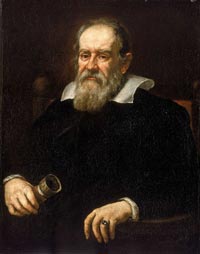
| Born: Feb 15, 1564 in Pisa, Duchy of Florence, Italy |
| Died: Jan 8, 1642 (at age 77) in Arcetri, Grand Duchy of Tuscany, Italy |
| Nationality: Italian (Tuscan) |
| Famous For: Kinematics, Dynamics, Telescopic observational astronomy and Heliocentrism |
Galileo Galilei was born in Pisa, where the leaning tower is located, in Italy in 1564. When Galileo was 10, he moved to Florence and he enrolled in the school at the Camaldolese monastery in Vallombrosa. He returned to Pisa in 1583 to begin his university education. He studied medicine there, but was also keenly interested in other disciplines, especially physics and mathematics. Due to lack of finances, Galileo had to leave the university after two years, and he did not complete his medical degree.
Professor of Mathematics
He supported himself by taking teaching jobs, and undertook further studies in mathematics and physics. He was particularly interested in the physics of motion. He eventually established a solid reputation as a physicist and mathematician. The University of Pisa offered him the post of chair of mathematics, which he accepted in 1589.
While at the University of Pisa he studied the physics of falling objects and published a work entitled On Motion. His views were different from established science on motion and falling objects, and led to him receiving negative criticism. Because of this, the university did not renew his post. In 1592, he took a position at the University of Padua, where he taught astronomy, mechanics and geometry. He remained there for 18 years, until 1610.
Controversy
Controversy was to follow Galileo throughout his life. Much of the problems arose from his controversial views on motion and astronomy. Galileo believed Copernicus’ theory that the earth was not at the center of the universe, with all other objects orbiting around it. His astronomical studies showed that the earth and the planets revolved around the sun.
Theologians were unwilling to accept this idea, because it contradicted several statements in the Bible that declare the earth is fixed and unmovable. This view was also shared by most astronomers at the time.
Inquisition
Galileo was accused of heresy by the Church for his scientific beliefs. Galileo was told to recant his ideas about the earth orbiting the sun, and he was placed under house arrest. His offending writings were banned and publications of Galileo’s writings, past or future, were forbidden. It was not until 1638, when he went completely blind and was suffering from other ailments, that he was allowed to go to Florence for medical consultation.
Legacy
Galileo died in 1642, and it would be more than 100 years before the Catholic Church finally accepted the heliocentric nature of the solar system. His contributions to science are held in high esteem, with Einstein declaring him the “father of modern science.”